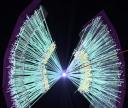Psychological Distance and Mental Energy
 In cognitive design we can model human-artifact interaction as a conversion of mental energy. We put mental effort into artifacts to use them and we get mental energy out in terms of how they make us think and feel. In this way interaction converts the mental work we must do to access functionality into the psychological lift – meaning, emotion and hardwired thinking – we get out of it.
In cognitive design we can model human-artifact interaction as a conversion of mental energy. We put mental effort into artifacts to use them and we get mental energy out in terms of how they make us think and feel. In this way interaction converts the mental work we must do to access functionality into the psychological lift – meaning, emotion and hardwired thinking – we get out of it.
So I am always on the look out for new insights into the nature of mental energy. Fortunately, there has been a lot to look at. With the discovery of mirror neurons there has been a small flood of studies that suggest we get/burn almost as much mental energy by observing a thing as we get from doing a thing. Consider the common experience of feeling exhausted after watching a emotionally-stirring movie. High engagement, high empathy observation burns/delivers nearly as much mental energy as the direct experience.
One recent scientific study that illustrates this is effect is, You Wear Me Out: The Vicarious Depletion of Self-Control. The researchers found a depletion in self control for those that observed others exerting it. They also found that reading about positive instance of self control (versus reading about failures to exert it) can increase the capacity for self control in subjects. If you don’t want to wade through the paper check out the excellent post, Being in Someone Else’s Head is Exhausting on the Neuronarrative.
 These findings suggest that our psychological distance from an event – thinking/reflecting, observing/emphasizing or participating/doing strongly determines the mental energy that flows from the experience. The relationship is not simply linear. Empathizing and doing for some things are nearly the same. Whereas the difference between thinking and doing can be opposite – one creating mental energy, the other burning it. This might explain why for example, vicarious experiences will produce behavior change (empathizing) when verbal persuasion does not (thinking). Further it may explain why some people with emotional intense jobs become remote – they increase their psychological distance to avoid the constant mental energy depletion associated with observing others in pain.
These findings suggest that our psychological distance from an event – thinking/reflecting, observing/emphasizing or participating/doing strongly determines the mental energy that flows from the experience. The relationship is not simply linear. Empathizing and doing for some things are nearly the same. Whereas the difference between thinking and doing can be opposite – one creating mental energy, the other burning it. This might explain why for example, vicarious experiences will produce behavior change (empathizing) when verbal persuasion does not (thinking). Further it may explain why some people with emotional intense jobs become remote – they increase their psychological distance to avoid the constant mental energy depletion associated with observing others in pain.
No matter, psychological distance and mental energy are fundamental to taking a systematic approach to cognitive design.